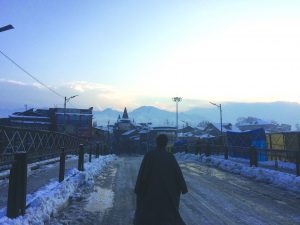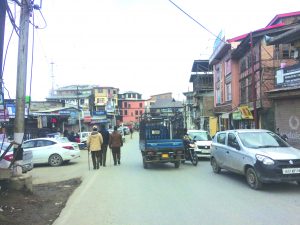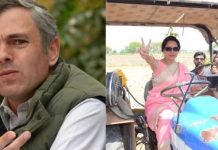 Being cut off from the rest of the world, the unavailability of internet and phone services made Kashmir the only place on earth to go through the longest internet shutdown. On my recent visit during chillai-kalan (40-days period of harsh winters), the city was freezing and so was my heart by looking at the emotionless faces. “Aap kya dekhne aye ho (you are here to see what)? See, we are very much fine. Our shops are open, so what, we never wake up with a smile on our faces,” said one of the grocery shopkeepers in Lal Chowk area.
Being cut off from the rest of the world, the unavailability of internet and phone services made Kashmir the only place on earth to go through the longest internet shutdown. On my recent visit during chillai-kalan (40-days period of harsh winters), the city was freezing and so was my heart by looking at the emotionless faces. “Aap kya dekhne aye ho (you are here to see what)? See, we are very much fine. Our shops are open, so what, we never wake up with a smile on our faces,” said one of the grocery shopkeepers in Lal Chowk area.
Since August 5, 2019, it has been more than five months that the people of Kashmir have been pushed to the corner with no information from the outside world; neither allowed to raise their voices.
The ‘new normal’ in Kashmir was visible everywhere as I navigated through the streets of Srinagar. Here on a nine-day visit, I encountered students, businessmen, locals but the Jhelum remained dead silent, joyless and lifeless.
Students
I met Nadiya at Jamia masjid in Srinagar, when she was coming out after performing namaz. She termed the current situation as “extremely bad”. Nadiya is a PG student in Kashmir University, who is very uncertain about her studies if this situation continues. She said, “I have no idea how I am going to complete my studies. It has been months that I attended proper classes. I can’t apply universities outside the valley due to internet shutdown.”
I visited Kashmir University, which made me realise that the students are going through the worse because of the recent lockdown. I tried conversing with students, but they refused to speak to Indian media.
A group of students in Kashmir University said, “Why would we talk to you. You are not going to show the truth. So, please leave us. But we hope you’ll get the right picture.”
I didn’t know what to say/answer.
However, I met Zoya, a last year B.Sc student, who was taking her regular walk and asked me to join her. Despite her disinclination towards Indian media, she was ready to speak about the current situation. Zoya said she wants to go out of the valley for further studies as she doesn’t see the situation getting better any time soon.
“Students have suffered the most because of shutdown and communication lockdown. Business can be started once again but we will never get back the time we have lost. Nothing can give us (students) those five months back.”
Rafique, a first year student, whom I met near Hazratbal Shrine, said, “It’s been months that I have attended classes. Earlier, we could have access online classes but due to complete internet shutdown we (students) couldn’t even do self-studies. A month ago, before restoring the postpaid numbers, students could not communicate with each other. Even the classes haven’t started properly, there is always an uncertainty.”
Another student, Tanya missed her chance this year to qualify for engineering due to all hartal and bandh. She Said, “I could not access the online notes due to internet blockade and applying for other universities remained my dream.”
Rabiya, a double PG and a B.Ed degree holder, said she is jobless and can’t apply outside because of internet shutdown.”
Locals
On my visit to Jamia Masjid on Friday, I observed a weird silence and less number of people inside the mosque premises. The J&K security personnel deployed at the gates of Jamia Masjid told me that these days they close the masjid at 2 pm, keeping the history of protests accruing at Jamia after Friday prayers.
He said, “The situation can get worse anytime, stone pelting may also take place. Otherwise the mosque is always open but these days we have to take precaution.”
After leaving masjid, I met one of the curtain sellers from the old city, who talked to me over a cup of tea about the loss of business. From earning ten to twelve thousand a day, his revenue has been cut to a mere thousand rupees. Arif (name changed on request) belongs to the Buhir Kedal area and has seen many protests in past.
One could sense fear in his voice. “The condition is looking normal from outside but there is a lot of pressure from authorities. People have stopped protesting majorly because they will be picked up in the evening if they go for any protest and no one can do anything once they take you,” he quivered.
“In my years experience, people have never been this scared. So many minors have been taken away and no one knows where they are Tihar or Agra,” Arif’s father joined in on the conversation.
Moving towards Eidgah, the Martyrs Graveyard, Wasim, my auto driver, explained me the situation.
“Jo karna tha wo kar diya, ab to jeene do. Mahine ho gye phone nahi chalta, bache school nahi jaa pate, koi kaam nahi hai karne ko. Sab band kar diya iss shutdown ne.” (They did whatever they wanted to, let us live now. There are no jobs, kids can’t go to school. This communication lockdown has crippled the normal life in Kashmir.)
On my way back, I visited Khanqah-e-Moula, the oldest mosque in Kashmir, an old man sitting at the shrine entrance said, “The situation is not good as it is looking. Nothing has changed here and nothing will. Kashmiri’s have learnt to live like this. You people may forget this (abrogation of Article 370) with time, but we will never.”
“Will you really write the truth?” asked a tea seller while serving me a cup of tea and snacks near Pulwama bus stand. My visit to his place surprised him and was not ready to believe that I am here to know what people really think. He said, “Why are you here. Why don’t you write like your fellow journalists sitting in Delhi that everything is fine in Kashmir?”
After a brief halt at the tea stall, I proceeded towards the lanes of Pulwama with a lot of hesitation in my mind about talking to anyone. After walking for a few minutes, I came across a group of people, who told me about the survival of life in the valley. At first, breaking the conversation was tough but then they explained how the never ending unrest has totally destroyed the market.
Rahim (name changed on request) runs a fabric business in Pulwama, talked about how Indian media has been manipulating news in Kashmir. He said, “India media has ruined the most and buried our (Kashmiri’s) voices.”
Despite the fabric business, Rahim could not make any profit during Eid, which is considered to one of the biggest festival in the valley. “I did not sell much. The whole Eid stock is in my warehouse and will go in waste or I have to sell in lower rate.”
Another man from the group, who runs a furniture shop, added, “I took money from bank for my business. Since, I haven’t made any money in past few months, I have to sell property to pay bank installment.”
While having conversation, I could see Rahim looking at the every passerby. When I asked the reason, he reluctantly said, “If someone sees me talking to you, I may be arrested or picked up in the evening.”
Rahim was more concerned about his family as he said, “Once they arrest someone, they harass their family. And it becomes an opportunity for them to earn money. Police ask for huge amount to release the minor or the innocent person from the custody.”
Last month on 25th January, 2G mobile internet services were restored in Kashmir after remaining suspended for over five months. In the time when almost everything depends on internet, government has snatched our basics. People are locked like animals in their own home.
However, since the abrogation of Article 370, foreign media presented a picture starkly different from its Indian counterparts as the latter is adamant on proving “normalcy” in the valley by forcing the new definition of ‘normal’. The emerging new face of normalcy has become a question for Kashmiris and their survival. But the question still remains unanswered, how normal is ‘normalcy’ in Kashmir?
Compared to my last visit, Kashmir seemed normal in terms of public transport and opened shops. But, do we really want this normalcy to become a new face of ‘normal’?
letters@tehelka.com














